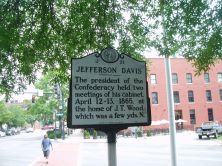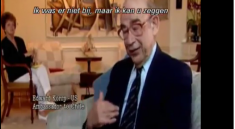John A. Bingham Summation in Lincoln Assassination Conspiracy Trial mentions telegraph sent from Greensboro, NC, John C. Breckinridge Confederate Secretary of War sent message to Jefferson Davis in Charlotte, Greensboro/Charlotte technically last capital of Confederacy
In one of the many ironies of the Civil War, Greensboro, NC in Guilford County, which was settled by numerous Quakers and therefore had much pro North anti slavery sentiment, was for a few days, one of the last capitals of the Confederacy.
John A. Bingham was an assistant to the Judge Advocate General in the trial of the Abraham Lincoln assassination.
From his Summation.
“But there is one other item of testimony that ought, among honest and intelligent people at all conversant with this evidence, to end all further inquiry as to whether Jefrerson Davis was one of the parties, with Booth, as charged upon this record, in the conspiracy to assassinate the President and others. That is, that on the fifth day after the “assassination, in the city of Charlotte, North Carolina, a telegraphic dispatch was received by him, at the house of Mr. Bates, from John C. Breckinridge, his rebel Secretary of War, which dispatch is produced here, identified by the telegraph agent, and placed upon your record in the words following:
“Greensboro’, April 19, 1865.
“His Excellency, President Davis:
“President Lincoln was assassinated in the theater in Washington on the night of the 14th inst. Seward’s house was entered on the same night and he was repeatedly stabbed, and is probably mortally wounded.
“JOHN C. BRECKINRIDGE.””
Read more:
http://www.famous-trials.com/lincoln/2174-binghamclose
From NC Historical Markers.
Jefferson Davis Marker in Downtown Greensboro, NC
Arriving by the Piedmont Railroad at Greensboro on April 11, 1865, Davis’s cabinet found a cold reception from residents, due mainly to Richmond’s perceived mismanagement of the war effort. While Davis found quarters with the nephew of his first wife, John Taylor Wood, his advisors were forced to make the “Cabinet Car,” a decrepit wooden boxcar, their mobile boardroom and sleeping quarters. Throughout April 12 and 13, Davis held meetings with his staff and generals Joseph E. Johnston and P. G. T. Beauregard on the feasibility of uniting tattered Confederate forces against the north or sending General Johnston to broker peace with the Union. After the meetings, Davis and his cabinet procured wagons and left Greensboro on April 15. Tennessee cavalry escorted them on the four-day journey to Charlotte. En route, Davis and his party spent the night of April 16, 1865 in a pine grove four miles east of Lexington and the following night, Easter Sunday, at the rectory of St. Luke’s Episcopal Church in Salisbury. Their next stop was at Concord on April 18th, where Judge and Confederate sympathizer Victor C. Barringer offered his residence on North Union Street to Davis and his party.
The next day the group reached Charlotte, where Davis first heard of Lincoln’s assassination while standing at the corner of Tryon and Fourth Streets, as he was about to enter the Lewis F. Bates residence. Contrary to some accounts, Davis is widely believed to have lamented Lincoln’s death, if not for the loss of a worthy adversary, for the rise of Andrew Johnson to the presidency, which Davis regarded as disastrous to the South. The Confederate government met in the Charlotte branch of the Bank of North Carolina from April 19 until April 22. Over that time, Davis also met with Governor Zebulon B. Vance, whose attendance was essential as the troops within North Carolina were the Confederacy’s last hope, despite the Union capture of Raleigh on April 13. The last meetings of the Confederate government occurred at the Phifer House in Charlotte from April 22 through 26.
On April 26, Davis and select members of his cabinet sought passage to South Carolina, hoping eventually to make their way to Florida. Some members of the cabinet left the group, such as George Davis, who returned to his family in New Hanover County. While traveling, the party met with former Attorney General Thomas Bragg and proceeded to Georgia. On May 10, however, Union forces, led by Colonel B. D. Pritchard, raided a makeshift camp near Irwinville, Georgia, where Davis and his entourage spent the night. Union forces captured the Confederate president, despite Davis’s efforts to conceal himself, and led him to be detained at Fort Monroe, Georgia, until his release two years later. “



